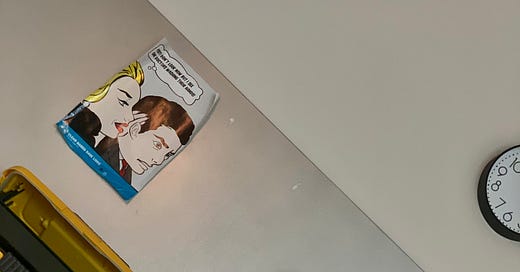Hello! Here’s this week’s freebie edition of More Than A Feilding which begins in the customary way with an invitation to become a paying subscriber.
I’d love to be able to give it all away, but sadly New World and the bookshop and Hammer Hardware continue to put their stuff behind a paywall, so I’m forced to follow suit. Trust you understand.
In a moment, this week's free edition, Run it like a business plus a preview of other recent editions.
But first, the button.
Run it like a business
JUL 29, 2024
What a revelation it was to 1980s New Zealand to learn that the only thing holding us back was dreadful inefficiency. Inefficiency everywhere. In our post office, in our forestry, in our ferries, in every office of every government department, even on our farms and in our great big companies.
How we threw ourselves into sorting that out, because you know us Kiwis: we love to get in there and get things sorted.
It was only after we were well into the sorting that it became apparent that this was actually one of those yes, but situations.
Yes, but massive unemployment
Yes, but brain drain
Yes but increased reliance on foreign investment and ownership
Yes but loss of key industries
And so on and so on, and so many unintended consequences, so much socioeconomic damage yet to be mended.
And yet a certain kind of person has never lost their unthinking and unwavering admiration for the idea that greater efficiency is the answer to everything you just need to get in there and get it sorted.
This, it is clear, is what passes for big picture thinking in the plodding mind of our prime minister. Get in there and sort it out and make it more efficient and cut and hack and don't forget to tell everyone how bad a job that last guy did and boy are you lucky you’ve got me now to sort it out.
He knows that a lot of people see things the same unthinking way. They too, have enthusiastically embraced this reductive way of thinking since they or their dad first heard of it in the 1980s.
And so they look at something like the health system and they think it must be wasteful because look how complicated it seems to be to do anything. They compare it to their own service station or car dealership or tyre shop and say FFS how hard can it be.
Here's a clue, sparky: a hell of a lot harder, a hell of lot more dots to join up, a hell of a lot more moving parts, and unlike your business where people have to pay, health care - for the very soundest of reasons - is a basic right freely available and so of course people turn up in great numbers, and at will, seeking care.
Even when you do that as efficiently as possible it can look unwieldy and unusually loaded with administration. It seems to take an awful lot of work to make it all run because it bloody does take an awful lot to make it all run.
There is nothing lazier and more misleading than picking out a fact McNugget like 14 layers of management and using that to make the case that the joint's a total mess.
Into the media go Luxon and Reti saying 14 layers of management and all those dealership and service station owners nod their heads and intone yep, sounds right FFS how hard can it be.
Not surprisingly when you ask them can you show us these 14 layers, it takes two days and bugger me, it turns out they've include the nurse, the doctor, the the CEO and the board and the patient.
There's a further truth to be understood here: go anywhere else in the world and you will find that they appear to have inefficiency too, they too have health systems that seem to be complicated to run. The reason for this is simple: health systems are inherently complex and unavoidably complicated things to run.
And in order for frontline doctors and nurses to do their frontline work, the unavoidable reality is you need people to make the computers and lights and lifts work too.
Policy adviser Clint Smith posted some helpful numbers on this today:
Reti cites this claim of 2,500 more administrative staff since 2017.
Well, guess what - Labour massively increased the number of medical staff (11,000 more Doctors, nurses, midwives) and they need support staff.In 2017, 2.6 Doctors, nurses, midwives per 'corporate' staff. Now, 2.8.
It’s true that it’s complicated and it may very well be true that it can be done better. But let's not fall for this government’s pat, lazy bullshit that undermines the very concept of administrative support. And let's not forget these people have a terrible record of starving, and running down, and not providing what is necessary.
It’s true that there's never enough to do everything you want in a health system, but it’s also true that we have the means as a first world economy to make the system work decently. Just as long you're not choking that funding off in order to give tax breaks to your boat, bach and BMW voters. You know, the ones who smugly tell you we just need someone to get in there and run it like a business.
Also this week in More Than A Feilding
Pick the adult
A couple of days before I started this trip, I had coffee with William McCartney, and he very kindly gave me valuable advice and a gift. We talked at length about what kind of bike would be best for getting you across Europe. This included, and he could not stress this enough,
Lovely piece of Turkey
More photos! Here we see two guys from New Zealand, mates since law school, now in their sixties, at the end of their 3,000 km ride from Nantes to Budapest. Some friends had their doubts. No-one should ever doubt our resolve.
Pictures at an exhibition
The greatest art is not only timeless and universal, it is also spookily good at predicting the future.
What he was thinking
1. Who was the splendid person who asked this splendid question of Shane Reti?







